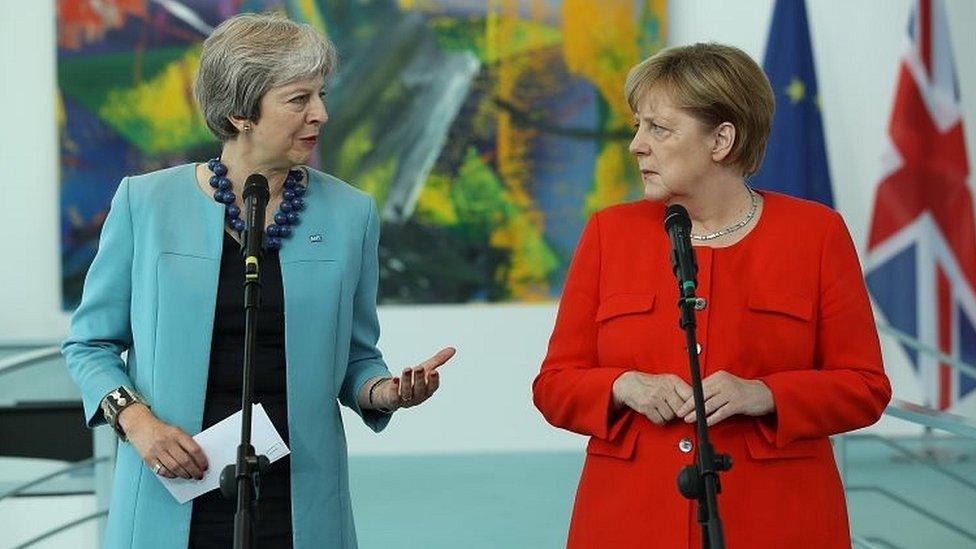Brexit: Theresa May meets Merkel ahead of cabinet summit
- Published
- comments

Theresa May has said she hopes her cabinet will be able to "discuss and decide on a substantive way forward" on Brexit at their crucial Friday awayday.
The UK prime minister told Germany's Angela Merkel she hoped this would lead to an increase in the "pace and intensity" of UK-EU negotiations.
As they met in Berlin, Mrs Merkel said Brexit talks were at a "crucial phase".
She said that a political framework for future relations needed to be clear by October.
Downing Street said Theresa May and Angela Merkel had "constructive" talks about Brexit in Berlin and the cabinet's discussions at Chequers would decide a "substantial way forward which would enable the pace and intensity of negotiations to increase".
Meanwhile Brexiteer ministers including Boris Johnson, David Davis, Michael Gove, Liam Fox and Esther McVey were holding talks on Thursday evening, ahead of the meeting on Friday.
Allow X content?
This article contains content provided by X. We ask for your permission before anything is loaded, as they may be using cookies and other technologies. You may want to read X’s cookie policy, external and privacy policy, external before accepting. To view this content choose ‘accept and continue’.
UK cabinet meeting on Friday
The two leaders' meeting came as Downing Street set out some of the detail of its new proposal for how trade between the UK and the EU could be handled after Brexit.
There are differing views within the cabinet about how closely the UK should stick to EU rules after Brexit, and what compromises should be made to achieve "as frictionless as possible" trade.
After months of tension and disagreement, the prime minster is gathering the entire cabinet at her country retreat, Chequers, with the aim of agreeing a UK proposal on how future relations with the EU will work.
That would then be the subject of negotiations with the EU - which might have different ideas.
The UK is due to leave the European Union at 23:00 GMT on 29 March 2019. But to allow time for parliaments in the UK and the EU to approve whatever deal is agreed, the aim is for the framework for future relations to be agreed this autumn.
What is the proposed trade plan being discussed?
According to No 10, the new plan would allow the UK the freedom to set its own tariffs on goods arriving into the country.
Technology would be used to determine where the goods will ultimately end up - and therefore whether UK or EU tariffs should be paid.
Downing Street says it is confident the arrangement would be partly in place by the end of the proposed transition period in December 2020 - with the system being fully operational by the next general election, which is due in 2022.
On regulations, it is understood that the UK would closely mirror the EU's rules - but Parliament would be able to decide where to deviate.
However, the arrangement has not been explained in full - and it is not clear whether the cabinet will back the plan, or whether the EU would agree.
Tensions over the plan
A source close to Brexit Secretary David Davis refused to comment on a Daily Telegraph report, external that he had already told Mrs May the plan was unworkable.
Mr Davis and Mrs May were "working closely on what will be presented on Friday", the source said.
However Mr Davis is expected to "forcefully" express his doubts and reservations about the compromise plan, including the view that it could be a mistake to set out too much of the UK's negotiating position at this stage
Among the issues that need to be resolved is the need to avoid new border checks between Northern Ireland and the Republic of Ireland when the UK is outside the customs union.
Eurosceptic MPs have warned Mrs May against tying the UK to the EU after it leaves, saying this will prevent it from striking its own trade deals with other countries.
Meanwhile 46 other Conservative MPs have written to Mrs May urging her to listen to the voice of business and target a deal which enables "frictionless trade to continue".
After Friday's meeting, the government is expected to publish a White Paper setting out its plans in detail.
The EU's questions, by Adam Fleming
The European Union asked a series of questions about the UK's previous customs proposals and they are still relevant.
Will it be temporary? Does it solve the Irish border issue fully or partly? Does it respect the integrity of EU customs policy? How is it supervised? How will the UK system evolve as the EU's does? Will the EU need to change its trade policy?
But customs is only a fraction of the relationship between the UK and the EU and so the British idea of aligning to some European regulations is a much bigger deal.
And the priority in Brussels is to find a solution to the Northern Irish border. "If there isn't a deal on that then things could turn nasty quite quickly," a diplomat told me.
The EU is waiting to see the full White Paper. Officials from the 27 remaining countries are primed to meet soon after it is published and ministers will give their reaction at a meeting on 20 July but civil servants in Brussels expect to be combing through it until the end of the month at least.
